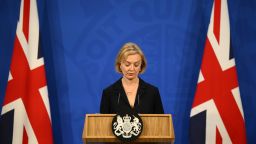Holding office for only 45 days, Liz Truss has become the shortest-lived prime minister in British history
Editor’s Note: Rosa Prince is editor of The House magazine. She is former assistant political editor of the Daily Telegraph and author of the books “Theresa May: The Enigmatic Prime Minister” “and “Comrade Corbyn: A Very Unlikely Coup.” The views expressed in this commentary are her own. View more opinion on CNN.
Holding office for only 45 days, Liz Truss has become the shortest-lived prime minister in British history after announcing her departure from Number 10.

And what a six weeks it was, marked by the death of a monarch and installation of a new king, a fiscal plan that crashed the markets and caused a run on the pound, the abandonment of her entire policy program, sacking of a chancellor and home secretary, loss of confidence of virtually all her MPs, reports of violent bullying in Parliament and opinion polls suggesting an existential wipe-out for her party at the next election.
Truss never had an easy task to unite her troubled party after winning the contest to replace Boris Johnson as prime minister. For the first time in Conservative history, she had not won the support of her own parliamentary party, but was voted leader, thanks to the Tories’ complicated voting system, largely due to the backing of rank-and-file party members.
Rather than build bridges by seeking to unite the party and bring rival factions into her government, she created further resentments, triggering immediate plotting. Installing allies into key Cabinet posts left her open to the charge that her team was both inexperienced and maverick.
This proved explosive when she and her close friend Kwasi Kwarteng, who she appointed Chancellor, drew up plans to put their academic economic theories into practice; the resulting “Trussonomics” plan in mid-September, which proposed tax cuts for the most wealthy to be paid for with borrowing, spooked the financial markets, leading the Bank of England to take emergency measures to shore up the pensions sector.
Truss’s response was ruthless; she dispensed with her comrade-in-arms Kwarteng and, in a desperate bid to soothe the markets, appointed the moderate Jeremy Hunt to lead the Treasury.
It wasn’t enough. As her detractors continued to seek ways to bring her down, events began to spiral out of Truss’s control.
Getting rid of a prime minister is not a simple task; under Conservative rules, she should have been protected from a leadership challenge for a year.
A dramatic 24 hours in Westminster
But on Wednesday, the Home Secretary, former rival Suella Braverman, quit, ostensibly over a minor breach of the ministerial rules, but with a barbed resignation letter which suggested she had ambitions to replace her.
That evening, Downing Street unwisely turned a vote on the controversial issue of fracking into a show of confidence in the prime minister; amid chaos in the Commons’ voting lobbies, and allegations of manhandling of reluctant MPs, the Chief Whip Wendy Morton was said to have resigned in exasperation, only for No 10 to message journalists in the early hours of the morning to announce she had stayed after all.
By now, the game was up. MP after MP called for Truss to quit both in public and private.
British Prime Minister Liz Truss announces her resignation, outside Number 10 Downing Street, on October 20.On Thursday morning, Sir Graham Brady, who as chairman of the 1922 Committee of backbench MPs acts as high executioner for moribund Conservative leaders, came to pay a house call on Truss at Number 10.
An hour later, she was gone, saying she could not “deliver the mandate on which I was elected by the Conservative Party.”
She went on: “I have therefore spoken to His Majesty the King to notify him that I am resigning as leader of the Conservative Party.
What happens next
There remains the complication that, unless the rules are changed, the contest to select a new Tory leader and prime minister will again involve those party members who elected the unpopular Truss in the first place.
To avoid that, the parliamentary party needed to agree on a unity candidate – most likely the man who had been the MPs’ first choice to replace Johnson, former chancellor Rishi Sunak.
It seems that proved impossible; Sir Graham has instead won the agreement of party chiefs to truncate the timetable for the leadership contest and so avoid a repeat of last summer’s nine-week affair. He has insisted that a new prime minister will be in Downing Street by Friday October 28.
In addition to Sunak and Braverman, the Leader of the House Penny Mordaunt and Trade Secretary Kemi Badenoch are likely candidates for the top job. There are even whispers that Boris Johnson could return from the cold – what an extraordinary, but by no means impossible, turn of events that would be.
In the meantime, Truss remains inside Number 10 for another week; the premiership she had longed for in tatters, outlasted – as one British tabloid quipped – by a head of lettuce.
https://edition.cnn.com/2022/10/20/opinions/liz-truss-resignation-45-days-disaster-prince/index.html


